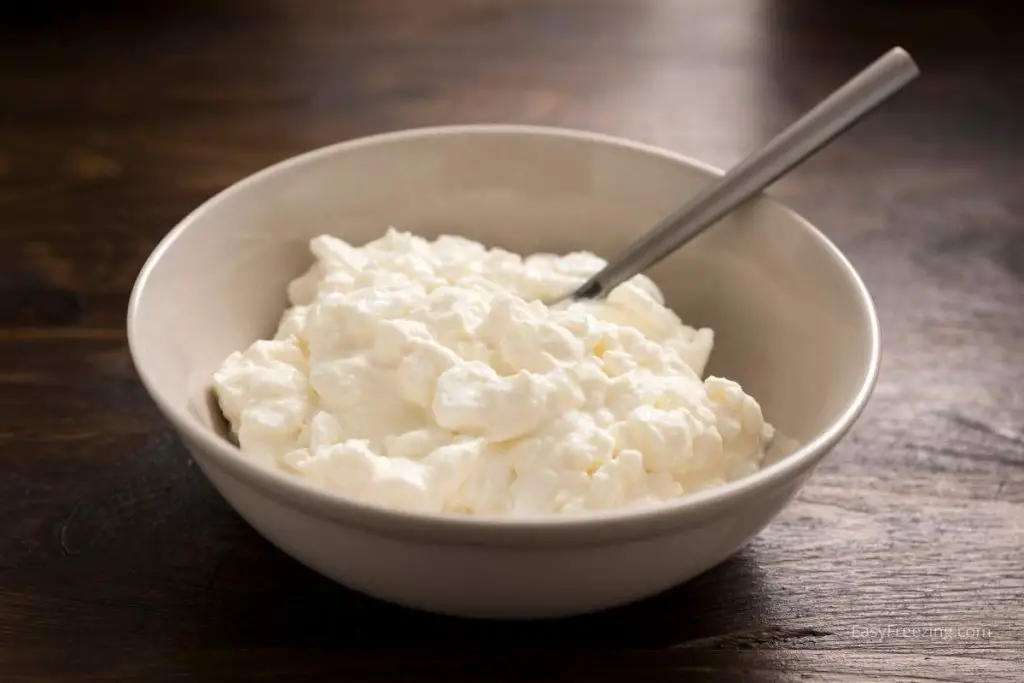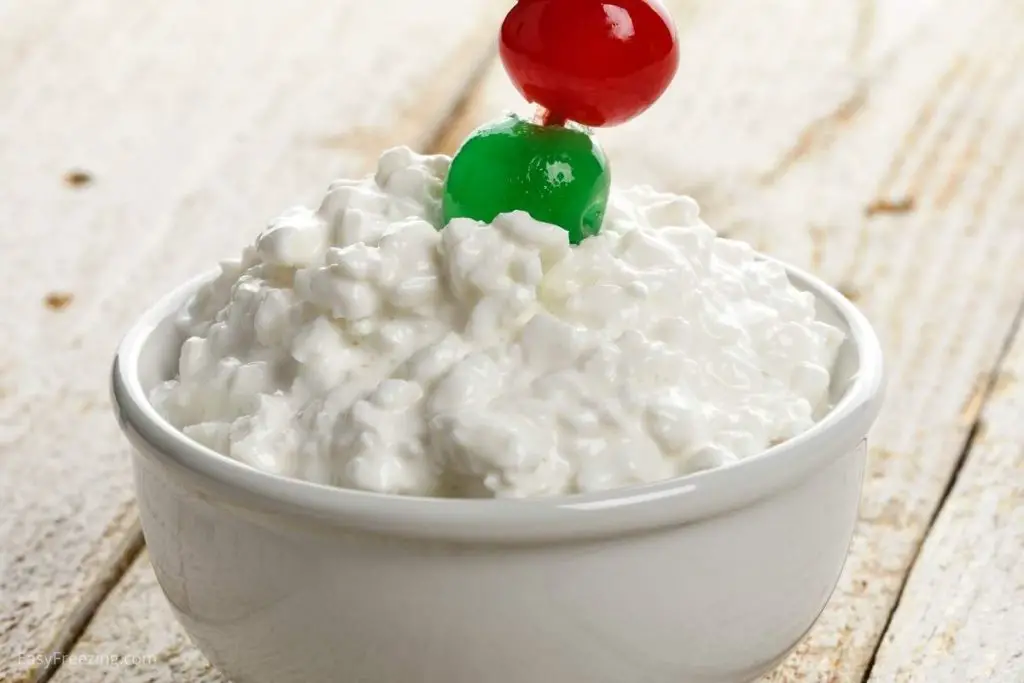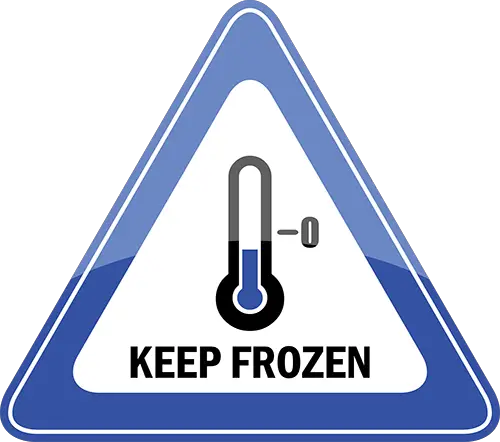Can You Freeze Cottage Cheese? (YES! Here’s How)
Cottage cheese is a food that goes bad pretty quickly. So if you buy it from the store and only want to use a little bit, you’re left with a lot that is going to go to waste. This might have you wondering if there is a way to keep your cottage cheese fresh for longer. More specifically, can cottage cheese go in the freezer?
Cottage cheese can be frozen, and it will stay good in the freezer for up to 6 months. This is a good way to extend the shelf life of cottage cheese if you can’t eat it all before it goes bad. However, some people don’t recommend freezing it because of the changes that can occur in taste and texture.
In this article, I will go into detail about how to freeze cottage cheese, tell you how long it will last in the freezer, and share everything else you will need to know about freezing cottage cheese. Let’s get started!

How Do You Freeze Cottage Cheese?
Freezing your cottage cheese is simple and easy. You can freeze it all in one big block, or if you are planning on defrosting smaller amounts at a time, you can freeze it in separate portions.
If you are freezing it in portions, you will need multiple containers that are freezer safe. If you don’t have reusable containers, you can use plastic ziploc bags.
In fact, freezer-safe bags are actually the best way to freeze cottage cheese. Whether they are plastic or reusable, bags that close are the best for keeping out as much air as possible.
All you have to do is put your cottage cheese into these bags and squeeze out as much air as possible before sealing. Then just put them in the freezer and you are done!
The reason that you want to keep air out of your cottage cheese when freezing is that this will mostly eliminate the chances of freezer burn. Freezer burn can be detrimental to the taste of your food, so trying to keep it from happening is very important.
How Long Will Cottage Cheese Last In The Freezer?
Cottage cheese can last for as long as 6 months in the freezer if you store it right. However, it can last as little as 2 months depending on the storage conditions and how old it was when it was first frozen.
If your cottage cheese was already pretty old when you froze it, it won’t last as long as if it had been frozen brand new.

The length your cottage cheese lasts also depends on if it was open or not when you froze it. Unopened cottage cheese will last longer than opened cottage cheese when you put it in the freezer. This is because opened cottage cheese has been in contact with more air, and therefore more contaminants have had the chance to get in it.
The general rule is that opened cottage cheese can last about 2-3 months in the freezer, whereas unopened cottage cheese will keep longer, for about 3-6 months. But remember that this is just the general rule, and it will change depending on all of the other storage conditions.
How Do You Thaw Cottage Cheese?
Cottage cheese takes a while to thaw, so you should give yourself plenty of time to do so. Usually, it’s best to thaw your cottage cheese overnight. If you originally froze it in portions, it’s super easy to just pop one in the fridge to let it thaw before you go to bed.
All you have to do is put your desired amount of frozen cottage cheese into a bowl in the fridge. Be sure to keep it in the container it was frozen in so that it isn’t exposed to any new air while it thaws. The bowl is just to catch any moisture that may develop on the outside of the container as the food thaws.
Make sure that you thaw it in the fridge. Leaving it out at room temperature makes it a lot easier for bacteria to grow, and it’s very likely that eating it will make you sick if you do this. That’s why putting cottage cheese in the fridge is very important when you are thawing it.
However, there is a way to thaw cottage cheese if you want it quickly but want to avoid bacteria growth from defrosting at room temperature. To do this, keep it in its container and place the container in a bowl of cold water on the counter. Be sure to change the water every 30 minutes so that it stays cold; this will keep bacteria from growing.
With this method, it should thaw within an hour or so.
Will Cottage Cheese Have The Same Taste And Texture After Being Frozen?
9 times out of 10, cottage cheese will not have the same taste and texture after you freeze it. This is the reason that a lot of people don’t like freezing their cottage cheese and will just end up tossing it out when it’s getting too old to be used.

The taste of the cottage cheese isn’t affected as much as the texture. Since it’s already pretty bland to begin with, freezing it might take away some of the flavor, but it won’t be super noticeable. Still, people with keen tastebuds might notice that frozen cottage cheese is less rich and has a blander flavor.
It’s the texture of frozen and thawed cottage cheese that gets most people. When it’s frozen, cottage cheese loses a lot of its moisture. Since cottage cheese has a lot of liquid to begin with, losing this moisture will significantly change its texture.
When it’s been frozen, it tends to be a lot more chunky and sticky than if it were fresh.
However, if you are planning on using your cottage cheese in some sort of baked dish, this probably won’t matter much. Mixing it with other things and baking it will take away from the change in texture, and it should still be pretty enjoyable.
But if you are planning on enjoying your cottage cheese plain or with fruit, you may want to think twice about freezing it.
Can You Re-Freeze Cottage Cheese That Has Been Thawed?
If you thaw cottage cheese but realize that you aren’t going to use all of it, you might be wondering if it’s possible to put it back in the freezer. While this is possible, it is highly unrecommended to refreeze cottage cheese.
When you re-freeze any food item, it will lose some of its quality because moisture is lost during the thawing process.

Cottage cheese already has such a different taste and texture after being frozen just once, and many people don’t recommend freezing it in the first place because of this. This means that re-freezing it is even worse because the taste and texture are altered even more.
If you don’t mind the alterations in taste and texture, it might not be as big of a deal for you. Re-freezing cottage cheese is completely safe, as long as it’s only been thawed for about 3 days and kept in an airtight container in the fridge.
So if you want to try to re-freeze it and see if you will still enjoy the changes this entails, go for it!
How Do You Know If Frozen Cottage Cheese Has Gone Bad?
The best way to tell if frozen cottage cheese has gone bad is to thaw it and check for strange smells, colors, or textures. If it has a lot of ice on it or smells strange before thawing, these are signs that it’s gone bad as well.
Ice shards indicate that it may be freezer burnt, which doesn’t necessarily make it unsafe to eat but will make it taste unpleasant.
Cottage cheese that is still good will be white, so if yours has a yellow color to it, it’s probably gone bad. Cottage cheese can also get a gross smell when it goes bad. The most common is a damp smell, but it could also smell rancid. Either way, this means that it is not good to eat anymore.
Lastly, cottage cheese that is going bad might have an odd texture. While it’s normal for cottage cheese to become clumpy after it’s been frozen, there may be changes in texture that aren’t normal. If your cottage cheese has a lot of different textures throughout, such as damp spots and chunky spots, this might be a sign that it’s going bad.
Can You Freeze Cottage Cheese – Final Thoughts
Cottage cheese is a great food, but most people wouldn’t recommend freezing it. Freezing cottage cheese will inevitably change its texture and may change its taste as well. But if you are using it in a baked dish or simply don’t mind this change, freezing it is a completely acceptable method of keeping it fresh.
The good thing is that freezing your cottage cheese is super easy and thawing it out takes minimal effort. Hopefully, this article has helped you learn about freezing cottage cheese, and now you might know whether it’s something that you want to do or not.






